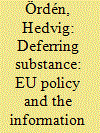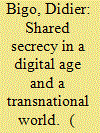|
|
|
Sort Order |
|
|
|
Items / Page
|
|
|
|
|
|
|
| Srl | Item |
| 1 |
ID:
163731


|
|
|
|
|
| Summary/Abstract |
Images taken by civilians and shared online have become an important source of conflict intelligence. This article explores issues around how states and non-state actors appropriate civilians’ images to produce intelligence about conflict, critically scrutinizing a practice often called open source or social media intelligence. It argues that image appropriation for open-source intelligence production creates a new kind of visual security paradox in which civilians can be endangered by their everyday visual practices because their digital images can be appropriated by outside actors as conflict intelligence. The transformation of everyday images into conflict evidence relies on what Barthes termed the photographic paradox, the paradox that while a photograph is clearly not the reality it depicts, the photograph is casually interpreted as a copy of that reality. When images are appropriated as conflict intelligence this photographic paradox translates into a security paradox. A visual security argument can be made without the intention or knowledge of the image producer, who then comes to perform the role on an intelligence agent. Yet civilians in warzones can hardly refrain from producing any images when they need to call attention to their plight, and to stay in contact with friends and relatives. The paradox, then, is that such vital visual signs of life can rapidly become sources of danger for the civilian. This civilian visual security paradox, it is argued, demands that intelligence actors respect the protected status of civilians in their online collection practices. So far, however, there is little sign of such respect.
|
|
|
|
|
|
|
|
|
|
|
|
|
|
|
|
| 2 |
ID:
163736


|
|
|
|
|
| Summary/Abstract |
The article describes EU cross-sectoral policy work on online information threats, focusing on the intersection between values and 'referent objects'. Examining discussions on strategic communication, censorship, media literacy and media pluralism, two value-perspectives were identified: while abstract procedural values of efficiency and coherence guide content management in the security/defence/internet communities, media/education communities highlight the end-goals of content pluralism and enhanced citizen judgement. In implementation, the former’s lack of substantive goals, coupled with an outsourcing of content management, may give rise to hybrid values. The findings highlight the danger of neglecting substance in favor of efficient management of an online ‘battlespace’.
|
|
|
|
|
|
|
|
|
|
|
|
|
|
|
|
| 3 |
ID:
163730


|
|
|
|
|
| Summary/Abstract |
This article sheds light on the complexity and sensitivity of crowd-based intelligence in security governance. The 'crowd’ as special manifestation of ‘the public’ is both challenging and enabling new forms of intelligence practices. As a spontaneous eruption of collective activity, the crowd is a notion of great versatility. Sometimes considered mad/dangerous, sometimes wise/useful, the crowd’s drivers are a context-dependent collage of (affective) group engagement, projection from the outside and the workings of digital technologies. The article traces how the existence of crowds in its variations is connected to how they are approached by security agents and their intelligence practices.
|
|
|
|
|
|
|
|
|
|
|
|
|
|
|
|
| 4 |
ID:
163728


|
|
|
|
|
| Summary/Abstract |
This special issue is based on the observation that today’s intelligence services stand before a difficult task of, on the one hand, having to manage the uncertainties associated with new threats by inviting civil actors in to help, while also, on the other hand, having to uphold their own institutional authority and responsibility to act in the interest of the nation. In balancing this task, we show how today’s intelligence practices constantly contests the frontiers between normal politics and security politics and between civil society and the state. In this introduction we argue that these changes can be observed at three different levels. One is at the level of managerial practices of intelligence collection and communication; another is in the increased use of new forms of data, i.e. of social media information; and a third is the expansion of intelligence practices into new areas of concern, e.g. cybersecurity and the policing of (mis-) information.
|
|
|
|
|
|
|
|
|
|
|
|
|
|
|
|
| 5 |
ID:
163732


|
|
|
|
|
| Summary/Abstract |
SOCMINT (SOCial Media INTelligence) is increasingly considered relevant and cost efficient information, and the exploitation of social media information in the name of security and public safety is generally regarded as unproblematic. We will critically scrutinize this claim and argue that the exploitation of such information by Intelligence and Security Services raises new ethical concerns. Drawing on recent moral discussions about privacy, we will argue that individuals have an interest in privacy in public spaces, including online spaces. We will discuss the role of such public privacy interests and argue that the systematic surveillance of social media platforms by security authorities potentially entail a negative chilling effect.
|
|
|
|
|
|
|
|
|
|
|
|
|
|
|
|
| 6 |
ID:
163734


|
|
|
|
|
| Summary/Abstract |
As cyber-security incidents become increasingly prevalent, we are facing a major political and democratic challenge: who comprises “the public” in relation to such incidents? Based on a study of the controversies surrounding the WannaCry ransomware attack, this article unpacks issues facing the creation of publics in contemporary ICT-mediated security practices. It shows how cyber-security incidents, such as WannaCry, do not neatly align with traditional national security politics and democracy, and it demonstrates the need to attend to how security publics are created. This may paradoxically entail both political and democratic challenges and possibilities for security politics in the digital age.
|
|
|
|
|
|
|
|
|
|
|
|
|
|
|
|
| 7 |
ID:
163733


|
|
|
|
|
| Summary/Abstract |
This article examines the notion of shared secrets and the procedures by which secrecy is not the opposite of exchange of information, but the restriction of it to a certain ‘circle’ of people and the maintenance of others in ignorance. It creates corridors depending on the objectives of secret information, the persons having access, and the knowledge of this access by other people. Shared secrecy has been considered as an exception to common practice, but it has changed in scale with digitization and transnationalization of information, especially when suspicion is becoming used in statistical terms for prevention purposes.
|
|
|
|
|
|
|
|
|
|
|
|
|
|
|
|
| 8 |
ID:
163735


|
|
|
|
|
| Summary/Abstract |
Defining intelligence is not just a terminological but also a political question. Intelligence methods are spreading quickly in the contemporary security landscape, and defining intelligence gives us a clearer idea of what we are in fact spreading, and therefore also of the political and social consequences that this may entail. When using intelligence methods in, say, policing, public administration or immigration services, we import a specific adversarial logic and thereby transform the social relationships that these regulatory and administrative practices support and rest upon. In this paper, I shall propose a new definition of intelligence in order to analyse the social transformations that may be produced by the logical structure implicit in the concept of intelligence.
|
|
|
|
|
|
|
|
|
|
|
|
|
|
|
|
|
|
|
|
|